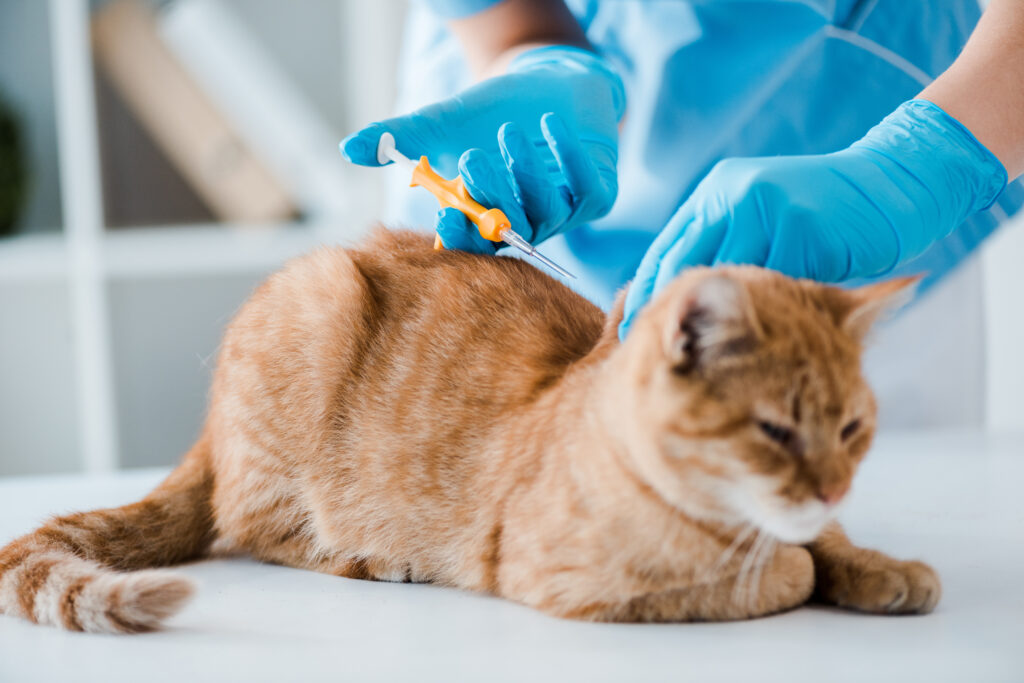Did you know that microchipping cats is soon to be a legal requirement in the UK? Here at The Cat & Rabbit Rescue Centre, we’ve always ensured all cats are microchipped before they are rehomed for their safety, security, and their owners’ peace of mind. With guidance from our Vet Nurse Sophie, we’ve put together some information and benefits of microchipping and why we support the UK government’s decision to make them compulsory.
What Is a Microchip?
A microchip is only about the size of a grain of rice and is usually inserted into the scruff area, or between the shoulder blades, on most animals. The procedure is very quick and does not require the use of anesthetic, as it causes no more discomfort than a routine vaccine. Microchips are small and durable, which makes them almost impossible to get damaged or removed and ensures they function for the life of your pet.
A microchip itself only stores a unique identification number. If your pet is found, a veterinarian or approved rescue center retrieves the identification number via scan and then uses this number to determine which company maintains your microchip in a private online database. The veterinarian or approved rescue center will then contact the microchip company for your contact information and reach out to you immediately. As a microchip won’t contain you contact details, address, or any other personally identifiable information directly, you won’t need to worry about privacy concerns.
While cats and dogs are the most common pets to receive microchips, many types of animals be microchipped including rabbits, horses and even reptiles!
Why Should I Microchip My Pet?
Even though wearing a collar and tag when first picking up your feline friend from The Cat & Rabbit Rescue Centre is required and generally recommended by all to wear at all times, your pet’s collar and tags can be removed or damaged, and if your pet gets lost, this significantly reduces your chances of being reunited. Microchips are the most dependable form of identification for your pet and are the best way you can be reunited with them if they go wandering and haven’t made their way back home yet. You can also report your pet as missing to the company that manages your pet’s microchip, so this is brought to the attention of veterinarians or approved rescue centers if your lost or stolen pet is brought in and scanned, where they can then contact you to be reunited with your furry friend.
It’s reported there are over 10.8 million pet cats in the UK, with as many as 2.8 million unchipped. For those choosing not to or are unsure whether they should microchip, it’s crucial to understand how important microchipping is for cats and the people who love them; from reuniting cats with their owners, identifying injured cats, or helping to ensure an owner can be informed in the sad event their cat has been hit or killed by a vehicle.
What Does This New Microchipping Rule Mean for My Cat & I?
Pledged under the government’s flagship Action Plan for Animal Welfare, soon all cat owners must ensure their pet is microchipped before the age of 20 weeks and their contact details stored and kept up to date in a pet microchipping database. This means you should always make sure you update your pet’s microchip details if you move house or change your phone number.
Cat owners found not to have microchipped their cat will have 21 days to have one implanted or may face a fine of up to £500.
The new cat microchipping rules will be implemented once a review regarding veterinary microchip scanning procedures is completed, where a date has not yet been announced. However, we suggest you ensure your cat is microchipped and check your microchip details are up to date even before this compulsory cat microchipping is officially introduced to protect your furry loved one if the worst does happen.
For more information about the UK Government’s mandatory cat microchipping rules, please visit https://www.gov.uk/government/news/cat-microchipping-to-be-made-mandatory

